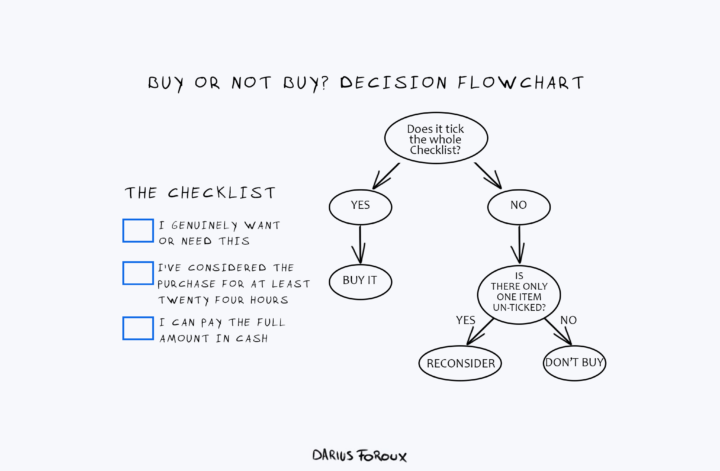Budgeting is the top advice you’ll often see when you Google, “how to avoid overspending on holidays.” After all, it’s hard to survive the holidays without budgeting.
Now, if your finances are so tight you can’t even afford to eat or pay rent in a few weeks; then overspending on the holidays is the least of your problems. In those cases, it’s natural to have a temporary budget.
Keyword: Temporary. Because budgeting in the long term won’t make you financially free.
But if you’re like most folks who can still cover their basic needs and just want to celebrate the holidays without overspending — then I don’t recommend being overly conscious of budgeting.
Because let’s face it: Budgeting brings up too many negative emotions. Who likes to live with restrictions on the money they earn themselves?
It’s your money and you can do whatever you want. If you restrict yourself, you’ll get frustrated.
The key is to manage your wants.
Stick to what you TRULY want
I don’t make a big deal out of the holidays. But I see it as an opportunity to step back from my usual routine.
Sometimes, a holiday is a great time to reflect: Are you going in the right direction? Are there important life experiences you’re missing out on?
Here’s a good thought experiment to journal about (my favorite journaling app is Reflection):
“If you only have 3 years left to live, how would you want to celebrate this holiday?”
I like to use 3 years because it’s a short enough time that you can’t afford to waste doing mediocre things. But it’s also long enough that you still have a future perspective. That means you can’t go “all out” and spend all your money on some crazy stuff. But you also don’t have all the time in the world.
For example:
- Is there an important loved one you haven’t spoken to in a while? Or someone you’ve always wanted to spend quality time with but never did because of various reasons. Take some time to meet that person and bond with them again.
- Have you always wanted to experience something that you kept putting off? Like traveling to a certain place or trying something you’ve always been afraid of. Think of an experience you would deeply regret not having if you only had 3 years left to live.
The ironic thing is, unless you’re a highly materialistic person, the things that you genuinely want likely don’t cost too much money. Often, they just require more time and effort. That’s the catch.
It takes less willpower and time to scroll through a shopping app and buy gifts for someone. Rather than reaching out to an old friend and spending quality time with them despite hectic and busy schedules.
And even if what you truly want costs more, like buying your first home or having a month-long vacation — Saving up and making that one big purchase is a smarter choice. Instead of gradually losing money on small purchases that aren’t truly important to you.
2 Quick Rules: “Money First” and “Avoid Convenience Costs”
If you can’t buy something with the money in your wallet (or e-wallet/expense account), then don’t buy it.
That means no impulse buying of higher-priced items. And NO HOLIDAY DEBT (especially with high interest rates). If you need to get into debt just to buy something for the holidays, then it’s not a good purchase.
Remember: This is a holiday expense. It’s not a life-or-death situation. Money means freedom because it gives you options. Before you click that “add to cart” button, always ask yourself:
“Do I really want to sacrifice portions of my financial freedom for a couple of weeks/months to buy this?”
The other thing about the holiday season is that it comes with a lot of hidden costs. One of those is “convenience costs.” The holidays can be hectic. So people are more willing to pay more for convenience. Like ordering take-out food because they’re too busy to cook, etc.
The key? Go back to the first item: Stick to what you genuinely want. And plan ahead. How do you ensure it’s convenient for you (and your loved ones) to achieve your plans? That’s how you cut down on “convenience costs.”
Holidays are meant to be enjoyed, not stressed over
One of the classic holiday movies is Home Alone. For my younger readers, it’s a story about a kid whose parents accidentally leave him behind at home as the rest of the family go on a holiday trip overseas.
The main reason the parents in the movie forgot about their child was because everyone was so busy: They were preoccupied with booking their hotels, setting up the travel itinerary, looking for restaurants to try, etc.
They were so busy stressing over the details of their plans that they forgot to look at what mattered the most: Their own family members.
Most people are probably not as neglectful as the folks in Home Alone. But being distracted by not-so-important details can happen to all of us now and then.
If you find yourself being overly stressed over the holidays, try to take a quick step back. Push the on-off button on your mind and ask yourself:
“What actually matters most to me and my loved ones?”
And focus on that. Sometimes, the most important things in life require less money and more time.




